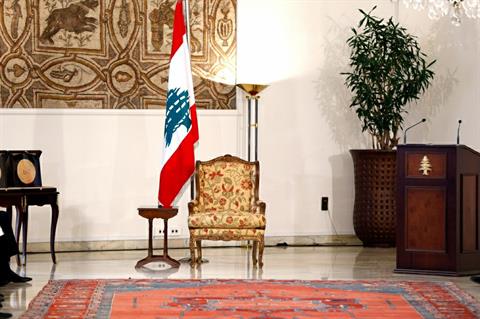The Lebanese Parliament failed to elect a new president for the 11th time on Thursday, prolonging a government vacuum that comes amid one of the worst economic crises of modern times.
MP Michel Moawad received the most votes with 34, but — as has happened many times in recent sessions — was beaten by 37 blank votes.
Another 14 were for “New Lebanon”, while 15 were declared invalid, including one for US Senator Bernie Sanders. There were a handful of valid votes for other names.
A two -thirds majority is required in the first round to win the race to be president in the 128-seat parliament. Subsequent rounds in the same session need only an absolute majority — or 65 votes. On Thursday, 111 MPs were present.
Mr Moawad has consistently been able to garner the support of a core bloc of MPs including those from Lebanon’s biggest party, the Lebanese Forces.
But he is nowhere near the vote threshold needed. His father, Rene, served as head of state for 17 days before his assassination in 1989.
Two “Change MPs”, the movement closely linked to the 2019 nationwide protests that led to the collapse of the-then government, announced they would stay in parliament until a president was elected.
One of them, lawyer Melhem Khalaf, called for successive sessions “without interruption” until a president was elected.
He said Lebanon did not “have the time nor the luxury to wait for the maturation of any settlement”.
Mr Khalaf described the “display of repeating the sessions” without any result as “absurd and reprehensible”.
In Lebanon’s confessional power-sharing system, the presidency is reserved for a Maronite Christian, the Prime Minister for a Sunni Muslim and the Speaker of Parliament for a Shiite Muslim.
Former army general Michel Aoun stepped down as president at the end of October, while Prime Minister Najib Mikati’s government is in caretaker status and thus severely stripped of power.
Mr Aoun and Mr Mikati were at loggerheads for months over the make-up of Lebanon’s cabinet and failed to reach an agreement before the former’s term ended.
The power vacuum is increasing fears of further political paralysis and that reforms needed to secure a bailout from the International Monetary Fund will not be implemented.
Lebanon’s economic collapse has been described by the World Bank as one of the worst in modern history, with much of the population pushed into poverty.
The financial crisis is being blamed on decades of mismanagement and corruption by Lebanon’s elite.
The local currency has lost more than 95 per cent of its value, inflation is rampant and there are widespread shortages of electricity, clean water, medicine and other basic essentials.
The National


Leave a Reply
You must be logged in to post a comment.